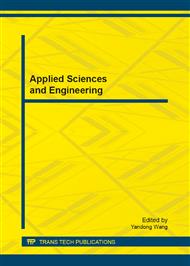[1]
C.S. Sung, S.H. Yoon, Minimizing maximum completion time in a two batch processing machine flowshop with dynamic arrivals allowed, Engineering Optimization, vol. 28, pp.231-243, (1997).
DOI: 10.1080/03052159708941133
Google Scholar
[2]
C.Y. Lee, R. Uzsoy, Minimizing makespan on a single batch processing machine with dynamic job arrivals, International Journal of Production Research, vol. 37, p.219–236, (1999).
DOI: 10.1080/002075499192020
Google Scholar
[3]
L. Mönch, H. Balasubramanian, J. Fowler, M. Pfund, Heuristic scheduling of jobs on parallel batch machines with incompatible job families and unequal ready times, Computers & Operations Research, vol. 32, pp.2731-2750, (2005).
DOI: 10.1016/j.cor.2004.04.001
Google Scholar
[4]
V. Chandru, C.Y. Lee, R. Uzsoy, Minimizing total completion time on a batch processing machine with job families, Operations Research Letters, vol. 13, p.61–65, (1993).
DOI: 10.1016/0167-6377(93)90030-k
Google Scholar
[5]
L. Dupont, C. Dhaenens-Flipo, Minimizing the makespan on a batch machine with non-identical job sizes: an exact procedure, Computers and Operations Research, vol. 29, p.807–819, (2002).
DOI: 10.1016/s0305-0548(00)00078-2
Google Scholar
[6]
P. Damodaran, P.K. Manjeshwar, K. Srihari, Minimizing makespan on a batch processing machine with non-identical job sizes using genetic algorithms, International Journal of Production Economics, vol. 103(2), pp.882-891, (2006).
DOI: 10.1016/j.ijpe.2006.02.010
Google Scholar
[7]
A.H. Kashan, B. Karimi, M. Jenabi, A hybrid genetic heuristic for scheduling parallel batch processing machines with arbitrary job sizes, Computers&Operations Research, vol. 35, pp.1084-1098, (2008).
DOI: 10.1016/j.cor.2006.07.005
Google Scholar
[8]
P.K. Manjeshwar, P.M. Damodaran, P. Srihari, Minimizing makespan in a flow shop with two batch-processing machines using simulated annealing, Robotics and Computer-Integrated Manufacturing, vol. 25, pp.667-679, (2009).
DOI: 10.1016/j.rcim.2008.05.003
Google Scholar
[9]
T.Y. ElMekkawy, S. Liu, A new memetic algorithm for optimizing the partitioning problem of tandem AGV systems, International Journal of Production Economics, vol. 118, pp.508-520, (2009).
DOI: 10.1016/j.ijpe.2009.01.008
Google Scholar
[10]
P. Neammanee, M. Reodecha, A memetic algorithm-based heuristic for a scheduling problem in printed circuit board assembly, Computers & Industrial Engineering, vol. 56, pp.294-305, (2009).
DOI: 10.1016/j.cie.2008.06.010
Google Scholar
[11]
N. Mladenovic, P. Hansen, Variable neighbourhood search., Computers Operations Research, vol. 24, p.1097–1100, (1997).
Google Scholar


